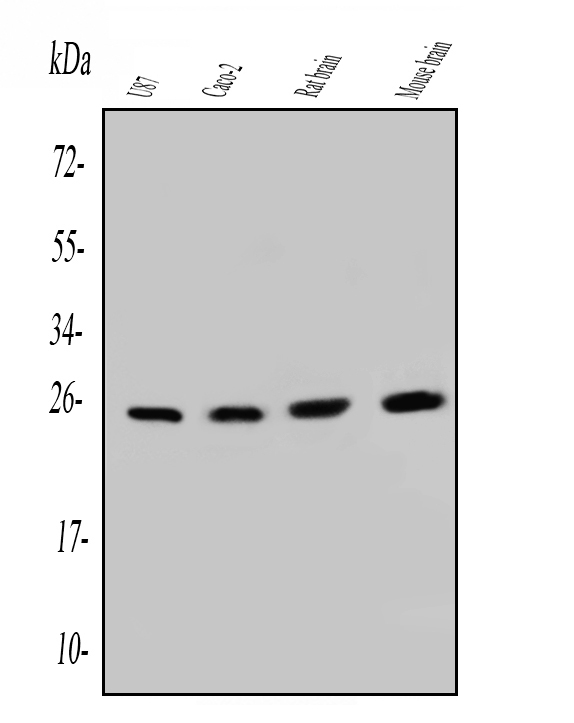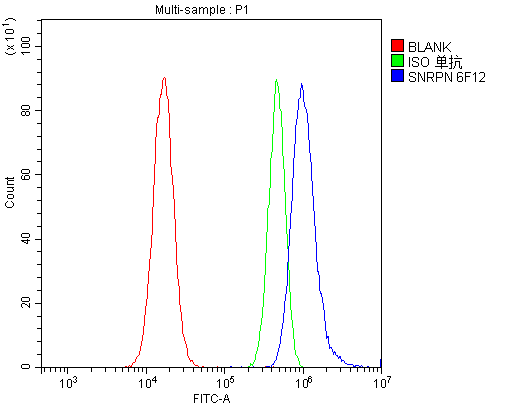Anti-SNRPN Antibody Picoband™ (monoclonal, 6F12)
- SPECIFICATION
- CITATIONS
- PROTOCOLS
- BACKGROUND

Application
| WB, FC |
|---|---|
| Primary Accession | P63162 |
| Host | Mouse |
| Isotype | Mouse IgG2b |
| Reactivity | Rat, Human, Mouse |
| Clonality | Monoclonal |
| Format | Lyophilized |
| Description | Anti-SNRPN Antibody Picoband™ (monoclonal, 6F12) . Tested in Flow Cytometry, WB applications. This antibody reacts with Human, Mouse, Rat. |
| Reconstitution | Add 0.2ml of distilled water will yield a concentration of 500 µg/ml. |
| Gene ID | 6638;8926 |
|---|---|
| Other Names | Small nuclear ribonucleoprotein-associated protein N, snRNP-N, Sm protein D, Sm-D, Sm protein N, Sm-N, SmN, Tissue-specific-splicing protein, SNRPN, HCERN3, SMN |
| Calculated MW | 26 kDa |
| Application Details | Western blot, 0.1-0.5 µg/ml Flow Cytometry, 1-3 µg/1x10^6 cells |
| Subcellular Localization | Nucleus. |
| Tissue Specificity | Expressed in brain and lymphoblasts. |
| Contents | Each vial contains 4mg Trehalose, 0.9mg NaCl, 0.2mg Na2HPO4, 0.05mg NaN3. |
| Clone Names | Clone: 6F12 |
| Immunogen | A synthetic peptide corresponding to a sequence at the N-terminus of human SNRPN, identical to the related mouse and rat sequences. |
| Cross Reactivity | No cross-reactivity with other proteins. |
| Storage | Store at -20˚C for one year from date of receipt. After reconstitution, at 4˚C for one month. It can also be aliquotted and stored frozen at -20˚C for six months. Avoid repeated freeze-thaw cycles. |
| Name | SNRPN |
|---|---|
| Synonyms | HCERN3, SMN |
| Function | May be involved in tissue-specific alternative RNA processing events. |
| Cellular Location | Nucleus. |
| Tissue Location | Expressed in brain and lymphoblasts. |

Thousands of laboratories across the world have published research that depended on the performance of antibodies from Abcepta to advance their research. Check out links to articles that cite our products in major peer-reviewed journals, organized by research category.
info@abcepta.com, and receive a free "I Love Antibodies" mug.
Provided below are standard protocols that you may find useful for product applications.
Background
SNRPN (Small Nuclear Ribonucleoprotein Polypeptide N), also called SMN, is a bicistronic imprinted gene that encodes 2 polypeptides, the SmN splicing factor, which is involved in RNA processing, and the SNRPN upstream reading frame (SNURF) polypeptide. The protein encoded by this gene is one polypeptide of a small nuclear ribonucleoprotein complex and belongs to the snRNP SMB/SMN family. SNRPN also encodes a long alternatively spliced transcript containing several small nucleolar RNAs (snoRNAs) and extends downstream to partially overlap the UBE3A gene in the antisense orientation. PWS arises from loss of function of genes in this region expressed exclusively from the paternal chromosome, suggesting that SNRPN may play a role in its etiology. The SNRPN gene is mapped on 15q11.2. Analysis of maternal DNA and of SNRPN cDNA confirmed that the maternal allele is not expressed in fetal brain and heart. Deletions in the transcription unit of the imprinted SNRPN gene occur in patients who have PWS or Angelman syndrome because of a parental imprint switch failure in this chromosomal domain.
If you have used an Abcepta product and would like to share how it has performed, please click on the "Submit Review" button and provide the requested information. Our staff will examine and post your review and contact you if needed.
If you have any additional inquiries please email technical services at tech@abcepta.com.













 Foundational characteristics of cancer include proliferation, angiogenesis, migration, evasion of apoptosis, and cellular immortality. Find key markers for these cellular processes and antibodies to detect them.
Foundational characteristics of cancer include proliferation, angiogenesis, migration, evasion of apoptosis, and cellular immortality. Find key markers for these cellular processes and antibodies to detect them. The SUMOplot™ Analysis Program predicts and scores sumoylation sites in your protein. SUMOylation is a post-translational modification involved in various cellular processes, such as nuclear-cytosolic transport, transcriptional regulation, apoptosis, protein stability, response to stress, and progression through the cell cycle.
The SUMOplot™ Analysis Program predicts and scores sumoylation sites in your protein. SUMOylation is a post-translational modification involved in various cellular processes, such as nuclear-cytosolic transport, transcriptional regulation, apoptosis, protein stability, response to stress, and progression through the cell cycle. The Autophagy Receptor Motif Plotter predicts and scores autophagy receptor binding sites in your protein. Identifying proteins connected to this pathway is critical to understanding the role of autophagy in physiological as well as pathological processes such as development, differentiation, neurodegenerative diseases, stress, infection, and cancer.
The Autophagy Receptor Motif Plotter predicts and scores autophagy receptor binding sites in your protein. Identifying proteins connected to this pathway is critical to understanding the role of autophagy in physiological as well as pathological processes such as development, differentiation, neurodegenerative diseases, stress, infection, and cancer.



